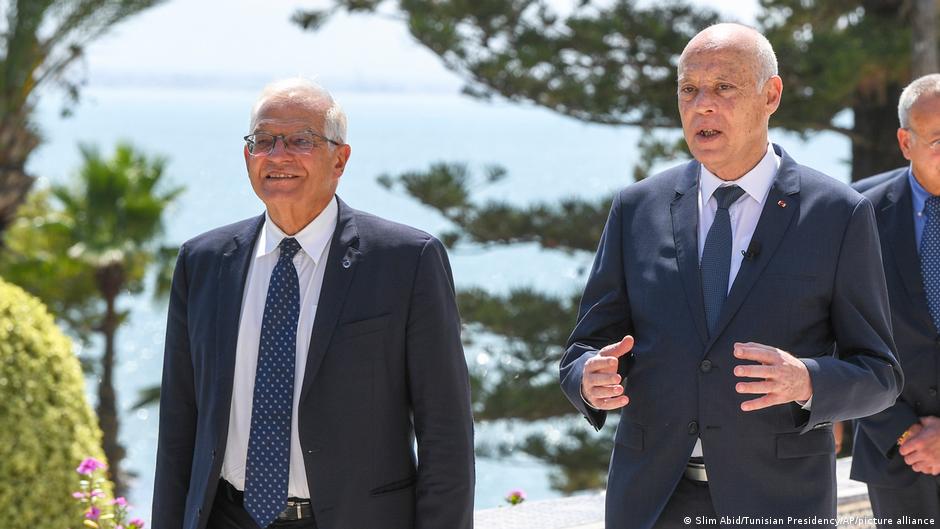Although the European union is fully preoccupied dealing with the fallout from the war in Ukraine on national security as well as energy security, its interest in the economic and political developments of the Middle East and North Africa has not diminished. Eu countries have provided financial aid to several Middle Eastern countries with suffering economies, as the result of the downturn from the COVID-19 pandemic, as well as rising food and energy prices due to the war in Ukraine. The EU also aspires to become an effective player in encouraging regional projects to combat climate change.
This interest by the EU has had many manifestations, including:
Supporting Structural Economic Reforms in Tunisia: the EU has been helping Tunisia since 2011 with its domestic challenges, such as slow economic growth, unemployment, and a large budget deficit, all which have been exacerbated by the Covid-19 pandemic. The EU has supported major economic structural reforms, social welfare programs, as well as improving the general environment for investment. On November 14th, the EU announced it would provide Tunisia with 100 million euros in aid, to help the economy recover, and to provide support to the most adversely effected Tunisians by rising food and energy prices.
The first installment amounts to 40 million euros, while the remaining installments will be linked to achieving progress on structural reforms. In May 2021, and May 2022, the EU had provided Tunisia with a loan of 600 million dollars to mitigate the impact of COVID-19, reduce the burdens on the budget, and implement major economic reforms.
According to statements by Tunisian Economic Minister Samir Saeed, on the 14th of November, the EU has so far provided almost 512 million euros to support Tunisian public finances, as well as providing technical support in Tunisia’s latest round of negotiations with the IMF. Tunisia, with the help of the EU, was able to reach an agreement with the IMF last October to get a new loan of 2 billion dollars that will be given out in installments starting next December. The latest grant from the EU is also part of the reform package that was agreed upon with the IMF in its future program.
Adding Pressure to End the Lebanese Political Stalemate: the EU has exerted pressure on all parties in Lebanon to elect a new president following President Michelle Aoun’s term coming to an end on the 31st of October. Lebanon is currently suffering a severe economic crisis, with the Lira losing 95% of its value, 80% of the population living below the poverty line. The transitional government does not have the mandate to make the reforms stipulated by the international community in order to provide financial assistance.
The EU has threatened to sanction Lebanese officials if they do not reach a consensus on choosing a new president. EU High Representative Josep Borrell highlighted the beginning of November these measures, which include sanctioning politicians or entities deemed responsible for undermining democracy or the rule of law in Lebanon, through hindering the formation of a government or holding elections or hindering the implementation of internationally backed reforms in the financial and monetary systems. So far, these pressures have not proven effective.
Aid to Suppress the Spread of Cholera in Lebanon and Syria: Economic collapse has hindered the ability of Lebanese authorities to maintain the public services necessary to combat the spread of Cholera, such as providing drinking water, power, and health services to Lebanese and refugees alike. The EU made available 800,000 euros to support these services in areas where cholera is rampant. The EU has also provided an additional 700,000 euros as humanitarian aid for Syria to help it contain its own outbreak of cholera, after having previously provided 4 million euros for the same purpose. More than half of Syrians depend on unsafe water sources, as a result of over 12 years of conflict.
Partnerships to Combat Climate Change: Combatting climate change in the Middle East is a priority for the EU, as the region is one of the most affected by this issue. The EU partnership and the GCC countries, is the most prominent of these cooperation efforts. The EU has supported some projects for sustainable energy in Lebanon and signed an agreement with Morocco to renovate its railways to become more sustainable.
The EU remains an influential player in the Middle East, in competition with other international players, including the US, Russia, and China. The EU is especially supportive in helping regional countries overcome economic difficulties, dealing with health emergencies, such as Covid-19 and the latest Cholera outbreak, as well as focusing on climate related issues. European countries are keenly aware that disruptions to the stability of this region, and to the human security of its inhabitants, are very likely to have negative consequences on their own stability and security.


